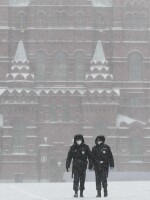MARY LOUISE KELLY, HOST:
There seems to be no end in sight for the migrant crisis on the border between Belarus and Poland. The EU has accused Belarus of enticing the migrants from the Middle East and elsewhere to fly there and then try to enter the EU through Belarus. But Poland is blocking the migrants and accusing Belarus and its ally, Russia, of using the migrants as pawns in an attempt to destabilize the EU - lots of complex things going on there.
NPR's Charles Maynes joins us from Moscow to explain. Hey, Charles.
CHARLES MAYNES, BYLINE: Hi there. Good to be with you.
KELLY: Start with the latest - just what is happening at the border today.
MAYNES: You know, well, today we saw - Belarusian state media showed videos of migrants being taken to a shelter inside a logistics center near the Polish border. This is the first time many have spent the night indoors since arriving to Belarus in this quest to make it from their home countries to the EU. Now, I should say the shelter for migrants seemed awfully well-timed. Western film crews were allowed near the border to witness the migrants there, to film and see what was happening. They also were there to see Polish border guards firing water cannons and smoke grenades at the migrants as they made a run for the border. So, you know, it just seemed like a media event designed to present Belarus as much more humane than the EU.
It has the added benefit, I suppose, of delegitimizing Europe as an alternative model in the eyes of Lukashenko supporters - this is the Belarusian leader - saying, look how, you know, they treat these migrants. Look at these sort of fake European values - so ultimately, just an attempt, I think, to win the optics of this crisis.
KELLY: Now, to the claims that the EU is making that Lukashenko manufactured this on purpose - I know he denies it. However, reporters are finding some evidence that suggest there may be something there. If it is true, why? What does he get out of this?
MAYNES: The roots of this really go back to the 2020 presidential elections. Lukashenko claimed to have won the election in a landslide. Many in Belarus and certainly the West disagree. The EU and the U.S. have both refused to recognize Lukashenko and sanctioned his regime for a brutal crackdown against the thousands of people that really has kept him in power over the past year. And so along comes this migrant surge, and it's a way to punish Europe for recognizing his political opposition. It's a way to force them to recognize him as the legitimate leader and maybe even demand sanctions relief.
I spoke with Artyom Shraibman. He's a Belarusian analyst now with the Moscow Carnegie Center who argues that, you know, fundamentally, this is a plea for dialogue - his quote - by Lukashenko.
ARTYOM SHRAIBMAN: He wants to be appreciated. He wants to be, if not respected or admired, then at least treated as someone who is necessary, who is, like, indispensable for the stability in the region.
MAYNES: So in other words, Lukashenko is creating chaos to show how good things were before he was forced to act out.
KELLY: And then we're talking about a crisis on the border between Poland and Belarus. What is Russia's role here? What is Vladimir Putin's stake in all this?
MAYNES: Well, you know, Russia says it has nothing to do with this crisis, but Belarus certainly is a Kremlin client state. But that doesn't mean that Lukashenko does everything that Russia or the Kremlin or Putin tells him to. In fact, it can be almost a little entertaining to watch how much Lukashenko seems to drive Russian President Vladimir Putin crazy. You know, when you watch them during press conferences or when they have to make appearances together, Putin rolls his eyes and kind of sighs as Lukashenko gives these long, long answers. And it just seems like he can't stand him. And yet, Russia offers him political support time and time again.
Well, why is that? Well, Lukashenko in power means Belarus is safely seen as a buffer against the West, against NATO. And the Kremlin clearly saw this kind of Ukraine-type scenario - in other words, a popular uprising in the events in Belarus over this past year. They simply don't trust the opposition. So Putin is essentially stuck with Lukashenko, at least until he can find a better option. And Lukashenko, through his prison system, you know, he does a pretty good job making sure there are no other options.
KELLY: NPR's Charles Maynes giving us the view from Moscow. Thank you, Charles.
MAYNES: Thank you. Transcript provided by NPR, Copyright NPR.


